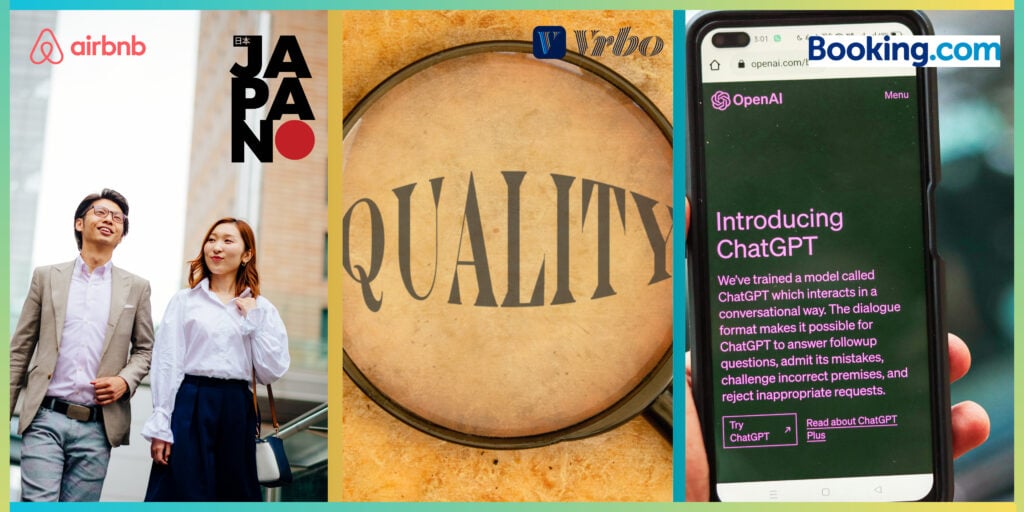Skip to content
Airbnb Launches Co-Host Marketplace in Japan, Vrbo to Delist Poor Listings, Booking.com Bets Big on India and AI
Airbnb Debuts its Co-Host Marketplace in Japan, Eyeing Supply Across Asia
- Airbnb’s Co-Host Marketplace, which first launched in the U.S., Canada, and select European countries in October 2024, is now also available in Japan—one of Airbnb’s priority markets in Asia.
- This marketplace will help homeowners connect with local, highly rated co-hosts who can manage listings, reservations, guest communication, and more.
- Airbnb claims listings managed by co-hosts typically perform better, noting that 75% of these co-hosts hold Superhost status, which indicates consistently high ratings and firm performance.
- Once connected through Airbnb’s Co-Host Marketplace, hosts and co-hosts can seamlessly coordinate using the Airbnb app.
- They can also share real-time access to booking calendars, allowing both parties to track reservations and availability accurately.
Snigdha’s Views:
- Airbnb has long eyed Japan as a key growth market in Asia, backing it with ad campaigns. It’s one of Airbnb’s priority markets as the company looks to grow beyond its core regions.
- Formalizing co-hosting with local Superhosts helps new homeowners launch compliant listings by partnering them with experienced hosts who know how to navigate local laws, permitting, and platform rules– making it easier for Airbnb to scale supply responsibly.
- Japan’s strict hosting regulations, language barriers, and unique cultural expectations make professional hosting support not just beneficial but essential—especially for new hosts entering the market.
- For existing property managers in Japan, the marketplace may introduce competition from local Superhosts.
- But it also opens a door: becoming a co-host could offer a new revenue stream or help operators scale without full ownership of new properties.
Vrbo to Delist Low-Quality Listings, Roll Out Promotions and AI Tools
- At the Short Stay Summit in London, Tim Rosolio, VP of Vacation Rental Partnerships at Expedia Group, stated that Vrbo is “doubling down on quality” and will begin delisting properties that repeatedly cancel bookings or receive poor guest reviews.
- While the company didn’t provide a threshold or clear benchmarks, the message is straightforward—properties that underperform won’t stay on the platform for long.
- Rosolio said, “We think supply quantity is a vanity metric. We believe that the real metric that matters is delivering great experiences and having those travelers come back to our platform because the experience was so good.”
- Vrbo is now rolling out more personalized promotions, including mobile-only deals, last-minute offers, and member-only discounts (OneKey).
- Vrbo is also testing AI tools to help hosts onboard faster using pre-filled content and smarter pricing suggestions—though these are still early-stage templates, not full automation.
Snigdha’s Views:
- Vrbo added 1 million new urban listings last year, and after aggressively growing supply, the platform is shifting focus to quality over quantity.
- Hosts with high cancellation rates or poor reviews risk being delisted, as Vrbo looks to tighten its standards—mirroring Airbnb’s efforts to elevate top performers and remove low-rated listings with its ranking system.
- If you’re listing on Vrbo, this is the moment to ramp up your efforts to ensure exceptional guest experience, review quality, and reliability.
- With AI tools and promo deals, Vrbo is aiming to improve conversion rates by giving you more levers to attract travelers—especially those booking last minute or via mobile.
- The AI onboarding tools may help individual hosts list faster, and professional managers could also cut down the time it takes to launch new units or expand to new markets.
- With dynamic packaging (flights, cars, rentals), loyalty perks, and smarter promotions under one roof, Vrbo is positioning itself as an all-in-one travel platform—similar to Airbnb’s ambition of becoming a travel and living brand in 2025.
Booking.com Eyes India’s Travel Boom—And Doubles Down on AI with OpenAI
- Laura Houldsworth, Managing Director and VP for APAC, recently highlighted India as one of Booking.com’s largest growth opportunities.
- Booking.com says that the surge is being driven by a rising middle class, growing disposable income, and increasing comfort with digital platforms.
- Indian travelers are especially active in outbound travel and tend to book at the last minute, a behavior Booking.com is adapting to.
- The company notes that while outbound demand grows, India’s inbound travel is also rebounding.
- Houldsworth pointed out that domestic spiritual travel is now fueling demand for alternative accommodations—a segment that’s growing fast for Booking.com.
- Meanwhile, on the product side, Booking.com continues to embed AI across its platform to enhance the full travel journey.
- In 2024, Booking.com rolled out a suite of AI tools—Trip Planner, Smart Filters, Review Summaries, Property Q&A, and Help Me Reply—developed with OpenAI.
Snigdha’s Views:
- Booking.com and Airbnb both are doubling down on Asia growth aggressively—especially with Airbnb’s recent efforts in Japan, Bali, and Goa.
- With Indian travelers often booking at the last minute, property managers need to stay operationally agile—offering flexible cancellation, mobile-friendly listings, and amenities that cater to cultural preferences like food access, family-friendly spaces, and essentials such as kettles or bidets.
- AI is becoming the next battleground for the big three OTAs. Booking.com is advancing fast with its OpenAI collaboration, Vrbo is playing catch-up, and Airbnb is steadily experimenting with new AI tools.
- Together, these tools aim to solve key pain points for property managers: simplifying search and discovery, cutting down guest support volume, surfacing key guest feedback, and speeding up communication.



![Trump-Era Policies Fuel Travel Uncertainty: Fewer Canadians, Europeans to U.S.—Fewer Americans to Europe [Early Data]](https://www.rentalscaleup.com/wp-content/uploads/2025/04/Trump-Era-Policies-Fuel-Travel-Uncertainty-Fewer-Canadians-Europeans-to-U.S.—Fewer-Americans-to-Europe-Early-Data-150x150.jpg)



